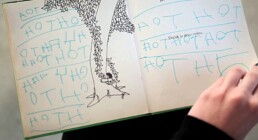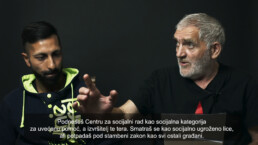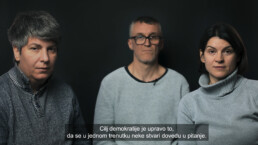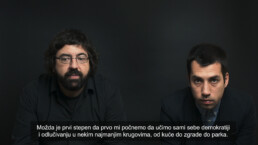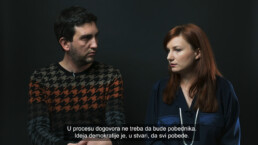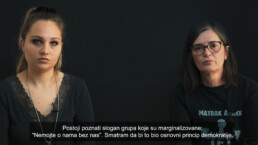KIOSK
Kiosk Dialogues
video interviews
9′
2010
Performing Democracy
video
2h 42′ 4″
2020
Kiosk Dialogues
video interviews
9′
2010
The work was presented at the 51st October Salon: The Night Pleases Us.
It was conceived as a communication platform, where the participants were co-creators and co-authors. They themselves chose how they would be presented, what they would say and how, fully aware that their statements would become integral parts of the artwork intended for public presentation.
It was carried out at the 51st October Salon in Belgrade in 2010. The participants were pupils of several Belgrade secondary schools: Electrical Engineering School Nikola Tesla; School of Beauty Care; the Third, Sixth and Twelfth Belgrade Grammar Schools. They were all asked to answer the same question, “What is your most impressive childhood memory?”
In October 2010, during the Salon, Kiosk Dialogues were broadcast on Studio B and RTS televisions.
The project was realized in cooperation with the Cultural Centre of Belgrade and Hartefakt Foundation.
© Kiosk and Cultural Centre of Belgrade, the October Salon Collection and the artists
Purchase Contract: III-5-519/24.11.2014.
Inventory No. 1391
Photo: still from the video work
Performing Democracy
video
2h 42’ 4″
2020
The work is created as a participatory dialogic platform and realised in the form of an experimental video forum in which the meaning and condition of democracy in contemporary society are considered. Starting from the question “What is democracy?,” the work includes the thoughts of 27 groups of interviewees, that is, 59 citizens of Serbia in total, who articulate, through their answers to this question, their views on the basic concepts integrated into the idea of democracy, the state democracy is currently in, in and beyond our country, as well as possible alternatives. Striving to include interlocutors in this dialogue who have quite different experiences, as well as those coming from different parts of the ideological spectrum, the project comprises representatives of citizens’ initiatives, movements, and organisations, representatives of political parties as well as Serbian citizens of different professions. In this way, the project explores different positions within the Serbian society, using a common experimental forum in which all participants have equal rights to be heard.
Interviewees: Slavoljub Kostić and Goran Jakovljević (participants of environmental protests in Bor); Jelena Miletić, Dragan Stojmenović, and Goran Milenković (Informal Communication Centre Nemušto/Mute in Bor); Božidar Savić (retiree) and Zorana Pavlović (independent artist); Zoran Lutovac and Dragana Rakić (Democratic Party); Milovan Pavlović (disability pension user) and Denis Ferizović (citizen of Serbia); Prof. Tamara Milenković Kerković, PhD, and Jugoslav Kiprijanović (Serbian Movement “Dveri”); Jelena Simić (assistant professor at the Faculty of Law, Union University) and Agata Milan Đurić (human rights activist); Jugoslav Ristić (president of the Alliance of Independent Trade Unions in Kragujevac), Zoran Marković (president of the FCA Fiat Chrysler Automobiles Independent Trade Union in Serbia), and Dragan Ilić (president of the Zastava Arms Independent Trade Union); Snežana Žujković (specialist of gynaecology and obstetrics) and Aleksandar Dukić (gynaecologist and obstetrician); Ljiljana Nadoveza (citizen of Serbia) and Ozren Nadoveza (unemployed); Vladimir Marović and Predrag Voštinić (Local Front); Marija Perković (worker) and Dženeta Agović (activist and president of the Impulse Organisation from Tutin); Marija Marinković, Danijel Dašić, and Mladen Jovanović (National Coalition for Decentralisation); Dobrica Veselinović and Radomir Lazović (Do Not Let Belgrade Drown); Vesna Vojvodić Mitrović and prof. Zoran Stojiljković, PhD (United Branch Trade Unions “Independence”); Milena Repajić and Ivan Velisavljević (The Party of Radical Left); Radomir Ćirilović and Vladeta Jovanović (“Prosperity” Association for the Protection of Consumer Rights); Iva Marković and Miloš Baković Jadžić (Right to Water Initiative); Marija Jakovljević and Galina Maksimović (Reconstruction Women’s Fund); Nataša Tasić Knežević (opera soloist at the Serbian National Theatre in Novi Sad) and Saša Knežević (pianist); Nevena Martinović and Filip Milošević (SHARE Foundation); prof. dr. sci Slavica Đukić Dejanović and prof. Predrag Marković, PhD (Socialist Party of Serbia); Milinka Minja Nikolić, Marica Stamenković, and Milijana Živković (activists, Balkan Mountains); Tanja Marković (activist) and Nebojša Milikić (member of the No to Rehabilitation Initiative); Olja Nikolić Kia (member of the Transbalkan Solidarity and Push Back Map collectives) and Teodora Jovanović (anthropologist); Tara Rukeci and Branislav Markuš (Zrenjanin Social Forum); Slađana Radivojević, Zorica Krunić, and Dušan Jović (Trstenik Theatre).
© Cultural Centre of Belgrade, the October Salon Collection and the artist
Purchase agreement: III-5-281/08.10.2021.
Inventory No.
Photo: video frame, courtesy of the artists
ABOUT THE AUTHORS:
The Kiosk Platform for Contemporary Art acts in the fields of contemporary art and culture, with the aim to create specific art dialogue platforms and enable the cooperation of artists and cultural workers with the widest audience. Kiosk initiates its works, exhibitions and projects believing that innovative art practices contribute to openness and enable a better understanding of social and political issues that are part of everyday life in modern societies. Kiosk was founded by artist Ana Adamović and art historian Milica Pekić in 2002.
Kiosk is a co-founder of the Independent Cultural Scene of Serbia Association and the Kooperativa Regional Platform for Culture. More information at www.kioskngo.net
